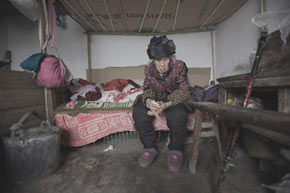 | ■ International
Legislating love
為愛立法
In aging China, old woman sues children for care
在日益高齡化的中國,一名老婦人控告子女,要求奉養 |
| As the daughter-in-law rolls open the rusted doors to her garage, light spills onto a small figure on a straw mattress. A curious face peers out. It's the face of Kuang Shiying's 94-year-old mother-in-law Zhang Zefang — better known as the elderly woman who sued her own children for not taking care of her. | 這名老婦的媳婦打開長了鏽的車庫門,光線照亮了草蓆上的一個瘦弱身軀。一張好奇的臉往外瞧。這張臉的主人是鄺世英(音譯)九十四歲的婆婆張澤芳(音譯),這名老婦更為人所知的是她是控告兒女棄養的老婦。 |
| The drama playing out inside this house reflects a wider dilemma. The world's population is aging fast, due to longer life spans and lower birthrates, and there will soon be more old people than young for the first time in history. This has left families and governments struggling to decide: Who is responsible for the care of the elderly? | 這戶家中上演的戲劇性事件,反映出一個層面更廣的兩難局面。由於平均壽命延長了,出生率也降低了,全球人口正在迅速高齡化中,歷史上首次老人比年輕人多的局面很快就會出現。這讓家庭和政府費盡心思決定:老人該由誰來負責奉養。 |
| A few countries, such as India, Singapore and France, now require adult children to financially support their parents. Twenty-nine U.S. states have similar laws. In China, over 1,000 parents have sued their children for financial support over the last 15 years. But in December, the government went further, amending its elder care law to require that children also support their parents emotionally. Children who don't visit their parents can be sued — by mom and dad. | 印度、新加坡和法國等幾個國家,現在都依法要求為人子女者提供父母財政上的給養,美國有廿九個州也有類似的法規。在過去十五年內,中國有一千多名父母曾控告他們的子女,要求提供金錢給養。但是去年十二月,政府更進一步地修正了照顧老年人的相關法律,規定兒女也得在感情上 侍親。不探望父母的兒女有可能遭到父母控告。 |
| Zhang Zefang, with her thin frame and soft smile, hardly looks like the vindictive matriarch many assume she must be. Zhang's children have all come up with reasons why they can't care for her. The oldest son, Zhou Mingde, only receives US$13 (approximately NT$380) a month from his pension and must pay for his paraplegic wife's medicine. The middle son, Zhou Yinxi, argues that at 68, he is broke. The youngest son, Gangming, 56, also says he is too poor to handle the care alone. All he and his wife, Kuang, have is a US$16 (approximately NT$470) monthly pension, two pigs and a cow. And the daughter, Zhou Yunhua, says she lives too far away. | 許多人以為體格削瘦且笑容溫柔的張澤芳是個「惡婆婆」,但情況完全不是這樣。她的兒女都提出了不奉養她的理由。大兒子周明德(音譯)每個月領到的退休金只有十三美元(約新台幣三百八十元),而且還得支付他半身不遂老婆的醫藥費,二兒子周寅熙(音譯)宣稱六十八歲的他已經破產了。五十六歲的小兒子周剛明(音譯)也說自己太窮,無法獨力奉養母親。他和他老婆鄺世英每個月只有十六美元(約新台幣四百七十元)的退休金,此外還有兩 隻豬和一頭牛。女兒周韻華(音譯)則表示自己住的地方太遠了。 |
| No one knew what to do. So they went to the village court. The court ordered Mingde, Gangming and their sister to take turns caring for their mother, and Yinxi to pay her US$10 (approximately NT$294) per month. So far, Yinxi has paid nothing. Zhang returned to live in Kuang's garage for a time. She now temporarily lives with her eldest son, Mingde, as the court ordered. Her new home is crowded with clutter and complaints. Mingde frets about the cost of medical care. Zhang stares vacantly at the ground as she talks. "I just wish I could die." | 大家都不曉得該怎麼辦,於是找上了村法院。法院下令明德、剛明和他們的妹妹輪流奉養老母,寅熙則每個月給她十美元(約新台幣兩百九十四元),但寅熙迄今分文未出。張澤芳回到鄺世英的車庫住了一段時間。她現在根據法院的命令暫時和長子明德一起住。她的新家擠滿了雜物與抱怨。明德為醫藥費苦惱。張澤芳雙眼無神地看著地板說:「我只求一死。」 |
沒有留言:
張貼留言